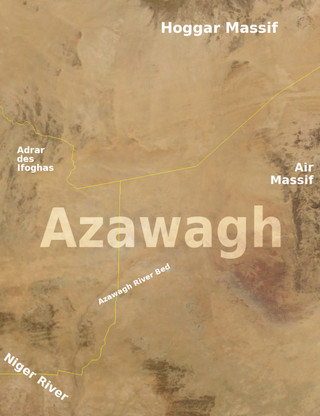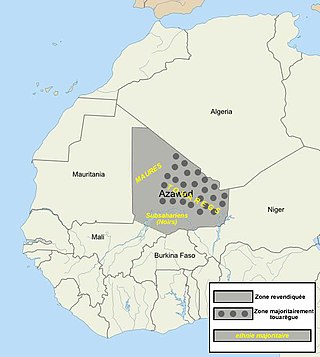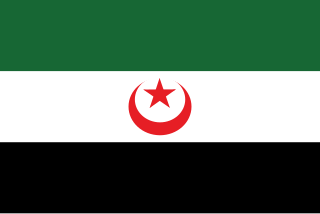Related Research Articles

Azawad, or Azawagh, was a short-lived unrecognised state lasting from 2012 to 2013. Azawagh (Azawaɣ) is the generic Tuareg Berber name for all Tuareg Berber areas, especially the northern half of Mali and northern and western Niger. The Azawadi declaration of independence was declared unilaterally by the National Movement for the Liberation of Azawad (MNLA) in 2012, after a Tuareg rebellion drove the Malian Armed Forces from the region.

Kidal is a town and commune in the desert region of northern Mali. The town lies 285 km (177 mi) northeast of Gao and is the capital of the Kidal Cercle and the Kidal Region. The commune has an area of about 9,910 km2 (3,830 sq mi) and includes the town of Kidal and 31 other settlements.

From 1990 to 1995, a rebellion by various Tuareg groups took place in Niger and Mali, with the aim of achieving autonomy or forming their own nation-state. The insurgency occurred in a period following the regional famine of the 1980s and subsequent refugee crisis, and a time of generalised political repression and crisis in both nations. The conflict is one in a series of Tuareg-based insurgencies in the colonial and post-colonial history of these nations. In Niger, it is also referred to as the Second or Third Tuareg Rebellion, a reference to the pre-independence rebellions of Ag Mohammed Wau Teguidda Kaocen of the Aïr Mountains in 1914 and the rising of Firhoun of Ikazkazan in 1911, who reappeared in Mali in 1916. In fact the nomadic Tuareg confederations have come into sporadic conflict with the sedentary communities of the region ever since they migrated from the Maghreb into the Sahel region between the 7th and 14th centuries CE. Some Tuareg wanted an independent Tuareg nation to be formed when French colonialism ended. This, combined with dissatisfaction over the new governments, led some Tuareg in Northern Mali to rebel in 1963.
People's Movement for the Liberation of Azawad was a Tuareg militant rebel group in northern Mali (Azawad). Initially based amongst exiles in Algeria and, especially, Libya, MPLA launched an armed campaign in June 1990. This fed into the disturbances already underway in Mali, and started a civil war. After the overthrow of the Malian government, and the introduction of electoral democracy, the rebellion gradually ceased.
The Revolutionary Liberation Army of Azawad is a Tuareg militant rebel group in northern Mali. The ARLA surged as a dissident group opposing the Tamanrasset Accords. In December 1991, the ARLA joined the United Movements and Fronts of Azawad (MFUA), which signed the National Pact peace treaty.
The Popular Liberation Front of Azawad was one of several militant rebel groups active during the Tuareg Rebellion in northern Mali from 1990 to 1995.

Kidal Region the eighth administrative region of Mali, covering 151,450 square kilometres or 58,480 square miles. This area was formerly part of Gao Region, but was created as a separate region in 1991. It is located in the north of the country, within the territory which the National Movement for the Liberation of Azawad proclaimed to be the independent nation-state of Azawad on 6 April 2012. This independence has not been recognized by any country or international organization. It was under the control of different armed movements such as the Ansar Dine and MNLA until January 2013, when French forces liberated the region. The Region's administrative capital is the town of Kidal.

The Azawagh is a dry basin covering what is today the northwestern Niger, as well as parts of northeastern Mali and southern Algeria. The Azawagh is mainly made up of Sahelian and Saharan flatlands and has a population that is predominantly Tuareg, with some Arabic-speaking and Wodaabe minorities and a recent influx of Hausa and Zarma.
The Dawsahak people, Idaksahak are pastoralist Berbers centered on Ménaka and Inékar town in Ménaka Region and Talataye in Ansongo Cercle of the Gao Region of northeastern Mali. They speak the Northern Songhai language Tadaksahak. Many also speak Western Tawallammat Tamajaq language, the Tuareg language of southern Gao. Daoussahak appears to be the most common transliteration of the collective name among French and English academics.

The 2012 Tuareg rebellion was the early phase of the Mali War; from January to April 2012, a war was waged against the Malian government by rebels with the goal of attaining independence for the northern region of Mali, known as Azawad. It was led by the National Movement for the Liberation of Azawad (MNLA) and was part of a series of insurgencies by traditionally nomadic Tuaregs which date back at least to 1916. The MNLA was formed by former insurgents and a significant number of heavily armed Tuaregs who fought in the Libyan Civil War.

The National Movement for the Liberation of Azawad or the Azawad National Liberation Movement, formerly the National Movement of Azawad, is a political and military organization based in Azawad in northern Mali.
Iyad Ag Ghaly, also known as Abū al-Faḍl, is a Tuareg militant from Mali's Kidal Region. He has been active in Tuareg rebellions against the Malian government since the 1980s – particularly in the early 1990s. In 1988, he founded the Popular Movement for the Liberation of Azawad. In the latest episode of the Tuareg upheavals in 2012, he featured as the founder and leader of the Islamist militant group Ansar Dine.

On 6 April 2012, the National Movement for the Liberation of Azawad unilaterally declared Azawad independent from the Republic of Mali in the wake of a rebellion which was preceded by a string of other Tuareg rebellions. It is called the Independent State of Azawad.

Bilal Ag Acherif is the Secretary-General of the National Movement for the Liberation of Azawad (MNLA) and president of a briefly independent Azawad.
The Battle of Khalil took place on 22–23 February 2013 and was part of the Northern Mali conflict, the battle began on the 22nd with two suicide bombings.

The Arab Movement of Azawad is an Arab military organization active in Azawad/northern Mali. Initially known as the National Liberation Front of Azawad, it was formed in early 2012, during the 2012 Tuareg rebellion. The MAA claims to be a secular, non-terrorist organization, whose main objective is to defend the interests of all the Arab peoples of northern Mali.

The Coordination of Azawad Movements (CMA) (Tamasheq: ⵜⴰⵙⵈ ⵏ ⵜⵏⴰⴾⵔⵢⵓⵏ ⵜⵢⵏ ⴰⵣⴰⵓⴰⴷ; Arabic: تنسيقية الحركات الأزوادية; French: Coordination des mouvements de l'Azawad) is a large coalition of Tuareg independentist and Arab nationalist groups which formed in Mali during the Northern Mali conflict in 2014.
The Tamanrasset Accords of 1991 were signed on January 6, 1991, between Malian chief of staff Colonel Ousmane Coulibaly, the chief of staff of the Malian Army, and Iyad Ag Ghaly, representing Tuareg militants. The accords aimed to put an end to the Tuareg rebellion of 1990, and led to the demilitarization of northern Mali, including the cities of Kidal, Gao, and Timbuktu. The accords were signed in Tamanrasset, Algeria, under Algerian mediation.
The Algiers Accords, officially referred to as the Accord for Peace and Reconciliation in Mali, is a 2015 agreement to end the Mali War. The agreement was signed on May 15 and June 20, 2015, in Bamako, following negotiations in Algiers between the Republic of Mali and Coordination of Azawad Movements.
Cheikh Ag Aoussa, nom de guerre Abou Mohame, was a Tuareg rebel leader and prominent drug trafficker.
References
- ↑ Mali Profile, iss.co.za Archived 2012-01-15 at the Wayback Machine .
- ↑ Togo, Theodore (2002). "The Rebellion In The North Of Mali". Peacebuilding: A Caritas Training Manual (PDF). Caritas Internationalis. pp. 232–235. Archived from the original (PDF) on 2011-06-12.
- ↑ Jean Sebastian Lecocq. That desert is our country: Tuareg rebellions and competing nationalisms in contemporary Mali (1946-1996). Universiteit van Amsterdam, (2002).
- ↑ Jean-Marc Balencie, Arnaud de La Grange. Mondes rebelles: guerres civiles et violences politiques. Michalon, (1999) ISBN 978-2-84186-091-3 p.264-5